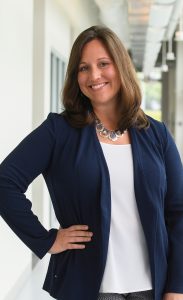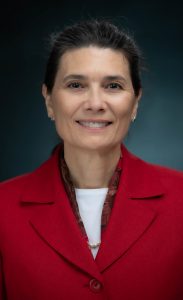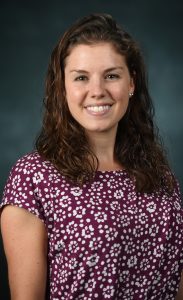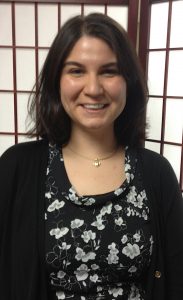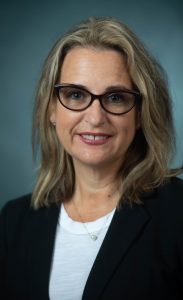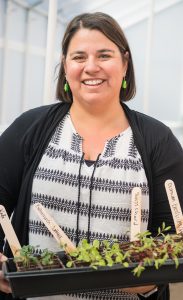OXFORD, Miss. – The University of Mississippi has received more than $1 million to further fund an initiative in Mississippi preschool programs that promotes social and emotional learning in children and could boost their overall well-being.
The $1,025,492 grant is from the W.K. Kellogg Foundation, an independent, private foundation that works with communities to create conditions that help children realize their full potential in school, work and life. Mississippi is one of the foundation’s priority places for investments.
The grant is bolstering Growing Healthy Minds, Bodies and Communities, an innovative standards-based preschool curriculum that combines yoga and mindfulness, gardening and nutrition, social-emotional competencies, physical activity, and anti-bullying and anti-bias to support the well-being of Mississippi’s children.
Piloted within early childhood programs across north Mississippi, the curriculum has potential to address major challenges facing the state through integrated strategies that nurture physical, social, emotional and intellectual health while cultivating community engagement.
“We are all grateful for such an amazing opportunity to make a large-scale impact on the well-being of children, teachers and families across Mississippi,” said Alicia C. Stapp, associate professor of health and physical education and one of the Ole Miss educators involved with the initiative. “I also was overjoyed and honored to know that a program we have invested in for almost four years will have the support needed to be implemented and include everything that we’ve hoped and dreamed for.
“We now have the capacity to make a significant difference in the lives of so many, and we believe this is just the beginning.”
Through the program, Mississippi is becoming an innovative leader in childhood education with the potential to develop and carry out the first, yearlong pre-K mindfulness curriculum in the country.
Besides Stapp, the interdisciplinary UM group working on the grant includes Tess Johnson, program manager, Department of Teacher Education; Laurel Lambert, associate professor of nutrition and hospitality management; Georgianna Mann, assistant professor of nutrition and hospitality management; Stephanie Miller, associate professor of psychology and director of the Experimental Graduate Program; and Kenya Wolff, assistant professor of early childhood education.
“It is a wonderful honor that the Kellogg Foundation believes in what we are doing and understands how exciting and important the initiative is to our preschoolers’ health and education,” Lambert said. “Now, we will be able to reach many more children in more communities.”
Started in 2019 in 10 pre-K classrooms in the Lafayette County and Oxford communities, the program has since expanded to the Sunflower County Consolidated School District and the Greenwood Leflore Consolidated School District.
The Kellogg Foundation grant will enable the initiative to expand into new areas such as the Delta Health Alliance Head Start programs and Jackson Public Schools, as well as to continue to research the curriculum’s impact and effectiveness.
The group also will grow its work with families and community partners by hosting events and programs that bring the classroom to homes.
Additionally, having discovered that children are eager for new yoga videos as opposed to reruns, the group will use grant money to create and produce eight additional yoga videos for classroom use. The videos are a unique aspect of the initiative as they strengthen each unit and reinforce the academic content learned in the curriculum lessons.
And to reap the benefits of gardening year-round, the initiative incorporates the use of tower gardens, aeroponic indoor gardening systems that can be placed in classrooms.
“Two-thirds of children in Mississippi are considered unprepared to enter kindergarten,” Stapp said. “We know that children who enter school behind continue to struggle to catch up.
“Although teachers in state-funded Mississippi pre-K collaboratives have been working on developmental skills, most preschool curriculums in the state primarily focus on academic learning in math and literacy. Given that social-emotional skills are the greatest predictor of future school success, a curriculum focused on whole child development integrating social-emotional skills in instruction is crucial to preparing children to learn.”
Beginnings of the Initiative
Although only a few years old, the Growing Healthy Minds, Bodies and Communities initiative has received external support from several areas to develop momentum and gain more funding.
Founded by Johnson, Stapp and Wolff, the initiative won a seed grant in 2019 through the UM Flagship Constellations research development program to pilot the initiative that fall.
In 2021, collaborators sought proposal development support through the university’s Interdisciplinary Research at UM, or IDRUM, a rebranding and broadening of the Flagship Constellations to reach more faculty members across additional collaborative interest areas.
And some of the awardees are members of the university’s Interdisciplinary Research Development, or INSPiRED, program, which concentrates on training faculty members in building, coordinating and directing large research efforts, including interdisciplinary programs and centers.
“IDRUM provides valuable resources and support as an interdisciplinary team,” Mann said. “I have served on the INSPiRED leadership and enjoyed being on both the participant side, unofficially, and in leadership. Being so involved with this great team also helped provide candid insight on how we better develop and meet the needs of interdisciplinary teams.
“It is great to see that the university supports this work through programming, but it does help to have extra funding to make us even more marketable.”
The initiative won further university support through a UM Achieving Equity Award to expand its parent and guardian engagement programming and a 2021 Excellence in Community Engagement Award to further support the initiative.
More awards were received in 2020 and 2021 from Move On Up Mississippi, a foundation created by Oxford chef John Currence in 2015 that inspires and funds educational initiatives to realize a healthier future for Mississippi children.
“Important funding through the UM Flagship Constellations grant helped start the project’s early pilot phases, but the overall support has meant a lot,” Miller said. “It has helped us to expand our project to help us support children not only in the classroom but also at home by providing the funding we needed to develop accessible parent education that complements our curriculum.”
Distinct Disciplines Working Together
Bringing together disciplines such as early childhood education, health and physical education, nutrition and hospitality management, psychology and teacher education has allowed the Growing Healthy Minds, Bodies and Communities initiative to take a multifaceted approach to preschool education.
“Supporting a child’s growth and development is not one-dimensional,” Lambert said. “Our different disciplines have allowed us to develop programs that support the whole growth of the child. It has been so exciting working on this initiative and with this research team because we all bring different perspectives and strengths to the project.”
Drawing different viewpoints from their various disciplines has been a key to the initiative’s success, Miller said.
“It has allowed us to draw on multiple approaches and disciplines to tackle the complex question of how to support whole child wellness across contexts,” she said. “Having team members from these areas has given us such a deep knowledge base and wide range of methodologies to draw from to better understand how to develop a successful curriculum and measure multiple outcomes across different environments.
“I learn something new every time we work together as a team and am proud of the way we have integrated so many different perspectives to support whole child wellness.”
Preliminary results from the first sites have been promising, and the group expects to report increased academic engagement and improved readiness assessment scores, healthy food behaviors and motor development in the students.
The group also anticipates reduced behavioral issues, bullying incidents, and implicit and explicit bias regarding differences among teachers, students and families while reporting an increase in teacher-reported positive social interactions among students and a reduction in classroom conflict.
“Central to the curriculum is an anti-bias approach, which acknowledges and celebrates differences among all people,” Wolff said. “Our goal is to begin challenging prejudice early to counter the many stereotypes and biases children face as they grow.”
Besides an expansion of the initiative, the Kellogg Foundation supports a curriculum enhancement plan that includes a 16-week pre-K mindfulness program and related lending libraries, continued professional development, more community partnerships that include working with the Mississippi Farm to School Network to develop outdoor gardening programs and greater family engagement with family yoga offerings and teacher retreats for educators.
Going forward, the group hopes to make the Growing Healthy Minds, Bodies, and Communities initiative accessible to any school, Johnson said.
“We want to continue doing this work and hope the Kellogg Foundation will continue to support our work,” she said. “We see a strong need for social and emotional support for school communities; we believe our program can be the resource teachers and students need.
“Our vision includes schools taking on the philosophy and embodiment of our program to help change their school culture. Wouldn’t it be amazing if every child knew the power of their breath?”
The Kellogg Foundation, based in Battle Creek, Michigan, works throughout the United States and internationally, as well as with sovereign tribes. Special emphasis is paid to priority places where high concentrations of poverty exist and where children face significant barriers to success.
The foundation priority places in the U.S. are in Michigan, Mississippi, New Mexico and New Orleans; and internationally in Mexico and Haiti. For more information, visit https://www.wkkf.org/.
The Growing Healthy Minds, Bodies and Communities Support Fund is open to accept charitable contributions from individuals and organizations to expand its work. To contribute, send a check with “GHMBC Education” noted in the memo line to the University of Mississippi Foundation, 406 University Ave., Oxford, MS 38655, or give online at https://ignite.olemiss.edu/project/26745.
For more information about supporting this interdisciplinary work for Mississippi children, contact Katie Morrison, director of foundation relations and strategic partnerships, at katie@olemiss.edu or 662-915-2135.



